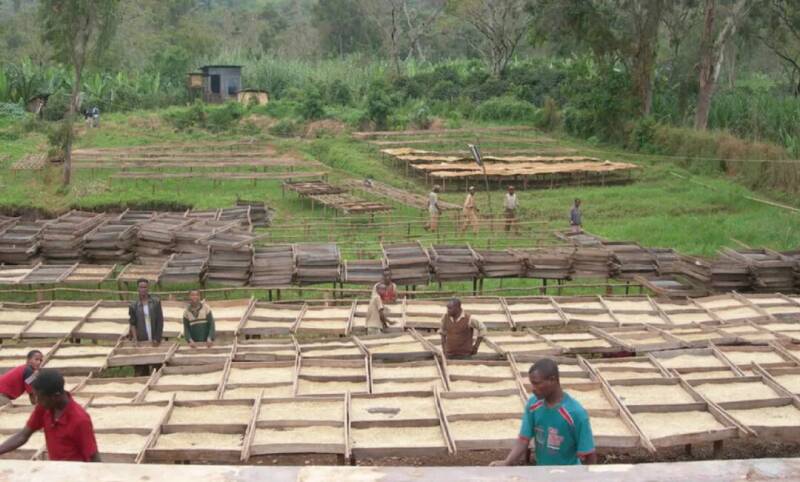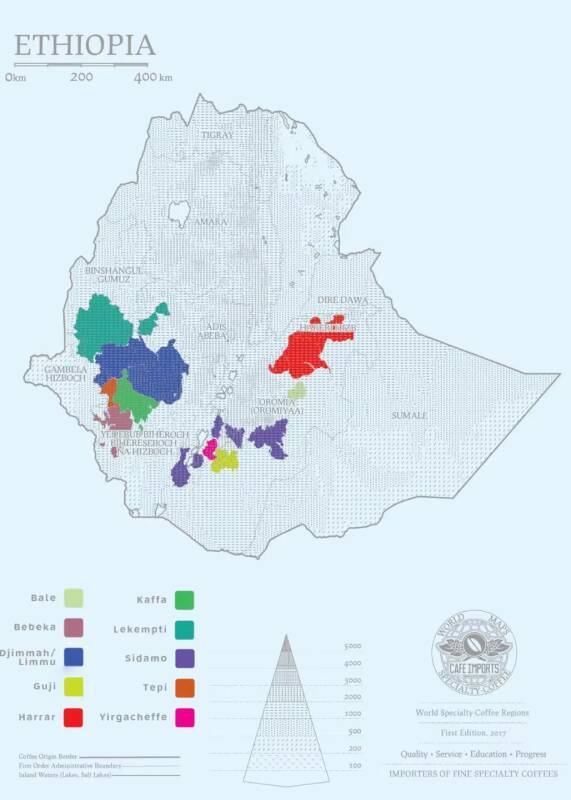Ethiopian coffee beans| Introduction of Golden Label Coffee Beans at Grisxia Village Estate in Banchmagi Region
Ethiopia is a mecca for coffee lovers. It is the birthplace of coffee and is now the largest Arabica coffee producer in Africa. And has the world's largest coffee gene pool, a wide variety of coffee, the well-known Rosa variety is also from the country.
Ethiopia Ethiopia
Ethiopia is located in the northeast of Africa, bordering Eritrea with Djibouti, Somalia, Sudan, South Sudan and Kenya. The territory is dominated by mountainous plateaus, most of which belong to the Ethiopian plateau, and the central and western regions are the main body of the plateau, accounting for 2ax 3 of the country. And the East African Rift Valley runs through the whole territory, with an average elevation of nearly 3000 meters above sea level.

Due to the high altitude, the climate here is pleasant, with an annual average temperature of 16 ℃, which belongs to the tropical steppe climate on the plateau, while the mountains belong to the plateau mountain climate, while the low elevations in the east and north are tropical desert climate. The whole year is roughly divided into dry season and rainy season, with an annual rainfall of 1237 mm. The country is rich in water resources and has many lakes and rivers. It is known as the "East African Water Tower". It is an ideal coffee growing area with nearly 50 volcanoes, rich water resources, diverse climate and high-altitude mountain areas.
Benji Maggie Bench Maji
The Bench Maji producing area, also known as the Bebeca producing area (Bebeka), is the capital of the Banchimagi region and is located in southwestern Ethiopia, a district under the southern ethnic states, just a few kilometers from South Sudan. There is a famous coffee estate here, the Rose Summer Village Manor (Gesha Village Coffee Estate), and the rose summer variety trees of the Rose Summer Village are found in the wild forest of Banchi Maggie.

Guoxia Village Manor Gesha Village Coffee Estate
The Rose Xia Village Manor, located in the Banchi Maggie producing area, is owned by documentary filmmaker Adam Overton and photographer's wife Rachel Samuel. While filming a documentary about coffee for the Ethiopian government in 2007, the couple discovered the Gori Gesha Forest Forest in the Bench Maji region and came up with the idea of starting their own coffee farm. Then, in 2009, when they met Willem, the owner of the Panamanian mule farm, and returned to Ethiopia in search of rose summer, they came to the place where Bench Maji is called Gesha Village, and found the area most likely to be primitive rose summer. After finding wild rose summer, seeds were collected from native rose summer trees, screened and planted in Rosa Village, and decided to build the estate here, named Gesha Village Rosa Village Manor.
Planting varieties and plots
At present, there are three coffee varieties: Rosa 1931 (Gesha1931), Gori Rosa (Gori Gesha) and Yilu Gbagbo (Illubabor Forest 1974) grown in Rosa Village Manor. In addition, the manor of Ruoxia Village is divided into 8 plots, each of which is planted with only one variety. Among them, oma, surma and narsha were planted in 1931, and Gori was planted in 1931, and Illubabor was planted in gaylee and dimma in 1931. Coffee cherries picked in each block are labeled to indicate the source and are tracked from the factory to the export through an internal tracking system.
Rosa 1931 (Gesha1931): the rose variety was first found in the Ethiopian Coffee Forest in 1931. It traveled to many countries because of its tolerance to leaf rust and eventually became famous in Panama. This rose summer variety is the original rose summer variety found by the owner of the village manor in the rose summer forest. Because it is very close to the Panamanian rose summer variety in genetic comparison, it is named Rosa 1931. Gori Gesha: in 2011, after the Rose Village estate was established, the landowner discovered a native pea species in the Gori forest 12 miles away, hence the name Gori Rosa. Iru Gbagbo 1974 (Illubabor Forest 1974): discovered during an expedition in the Illubabor Forest in 1974, an antibody variety was developed by the Ethiopian Research Centre and is currently only grown on the Rosa Village manor. Classification of Rose Xia Village
The coffee decomposition of Roxia Village is based on the business model of some estates in Panama, which is different from the traditional classification in Ethiopia. At present, Roxia Village is divided into competitive bidding batches, gold bid batches, red bid batches, green bid batches and Chaka batches. There are five kinds.
Bidding lot (Champion's Reserve/Farm Reserve): this batch only accounts for 3.7% of the annual output of Ruoxia Village, which is the top batch of the manor after strict selection, while the bidding batch is divided into champion selection (Champion's Reserve) and manor selection (Farm Reserve). Currently, it can only be obtained in the global bidding of Rosia Coffee Manor. Gold bid batch (Rarities): this batch is the highest quality of the non-competitive bidding batch in Ruoxia Village, and the gold bid only accounts for 10% of the output of the whole manor. Red mark batch (Growers Reserve): the red mark batch accounts for 15% of the output of Rose Xia Village Manor, and the beans of this batch need to reach more than 88 points in the SCA cup. Green-marked batches (Single-Terroir): green-marked batches do not require cup scores, but can be traced back to parcels, varieties, treatment methods and time. Chaka batch (Chaka): Chaka batch is to mix all the plots and varieties of the whole estate together, without emphasizing the subdivision of the batch. Qianjie Coffee Ethiopia Rosa Village Manor Jinbiao Coffee Bean production area: Banchi Maggie Manor / processing Plant: Rosa Village Manor elevation: 1931-2040 m Variety: Rosa 1931 treatment: sun flavor: citrus berry chamomile cantaloupe tea
The roasted beans of Qianjie Coffee in Rose Xia Village are sun-treated and lightly roasted. In front of the street, the proportion of V60JEL is 15, 92 ℃, and the aroma of chamomile and ripe fruit will be smelled. There will be citrus, berry, cantaloupe flavor, delicate acidity, fruit-like sweet finish, light tea taste, clean and balanced taste.
Important Notice :
前街咖啡 FrontStreet Coffee has moved to new addredd:
FrontStreet Coffee Address: 315,Donghua East Road,GuangZhou
Tel:020 38364473
- Prev

Breaking into the embassy! Ecuador's armed conflict, diplomatic turmoil affecting coffee and tourism industries
Recently, the Chinese Embassy in Ecuador issued a notice saying that the security situation in Ecuador has been grim again recently, with frequent violent crimes in coastal areas, resulting in many casualties. Chinese citizens and institutions are reminded to pay attention to personal and property safety, raise awareness of self-prevention, travel carefully to the coastal areas of Ecuador and avoid
- Next

Hong Kong's online coffee brand % Arabica next to a lamp post, causing injuries
▲ Click attention| Daily boutique coffee culture magazine coffee workshop comprehensive customs clearance, more and more mainland tourists go to Hong Kong tourism consumption, in addition to running to a variety of Hong Kong-style food and shopping holy land, but also do not forget to go to the high film rate of "online hit card." Among them, a %A located on the waterfront of Kennedy Town in Western District
Related
- What grade does Jamaica Blue Mountain No. 1 coffee belong to and how to drink it better? What is the highest grade of Blue Mountain coffee for coffee aristocrats?
- What are the flavor characteristics of the world-famous coffee Blue Mountain No. 1 Golden Mantelin? What are the characteristics of deep-roasted bitter coffee?
- Can I make coffee a second time in an Italian hand-brewed mocha pot? Why can't coffee be brewed several times like tea leaves?
- Hand-brewed coffee flows with a knife and a tornado. How to brew it? What is the proportion of grinding water and water temperature divided into?
- What is the difference between Indonesian Sumatra Mantinin coffee and gold Mantinin? How to distinguish between real and fake golden Mantelin coffee?
- What does bypass mean in coffee? Why can hand-brewed coffee and water make it better?
- Unexpected! Ruixing Telunsu lattes use a smoothie machine to foam milk?!
- % Arabia's first store in Henan opens into the village?! Netizen: Thought it was P's
- Does an authentic standard mocha coffee recipe use chocolate sauce or powder? Mocha Latte/Dirty Coffee/Salty Mocha Coffee Recipe Share!
- What is the difference between Vietnam egg coffee and Norway egg coffee? Hand-brewed single product coffee filter paper filter cloth filter flat solution!

